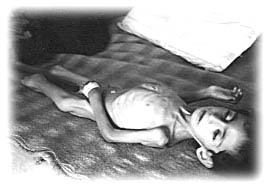
Children and the Fear of War and Terrorism

Terrorist attacks and threats or realities of war are frightening experiences for all. Children may be especially fearful that threatened or actual military action overseas will result in more personal loss and violence at home.
The degree to which children are affected will vary depending on personal circumstances. Children who have suffered a personal loss from, or had firsthand exposure to, terrorist acts or military actions will be much more vulnerable. Also at greater risk are children whose parents are in the military or in active duty in the reserve forces, and those children whose parents are involved in emergency response or public safety.
All children, however, are likely to be affected in some way by war or terrorism involving their country. For many, the guidance of caring adults will make the difference between being overwhelmed and developing life-long emotional and psychological coping skills.
Emotional responses at these events vary in nature and severity from child to child. Nonetheless, there are some similarities in how children and adults feel when their lives are impacted by war or the threat of war:
Fear: Fear may be the predominant reaction--fear for the safety of those in the military as well as fear for their own safety. Children's fantasies of war may include a mental picture of a bomb being dropped on their home. While their worries are probably exaggerated, they are often based on real images of terrorist attacks or war scenes. When children hear rumors at school and pick up bits of information from television, their imaginations may run wild. They may think the worst, however unrealistic it may be. Any publicized threat of war or terrorism close to their home may also add to their fear.
Loss of control: Military actions are something over which children, and most adults, have no control. Lack of control can be overwhelming and confusing. Most people experienced these feelings in the immediate aftermath of the terrorist attacks. Children may grasp at any control that they have, including refusing to cooperate, go to school, part with favorite toys, or leave their parents.
Anger: Anger is a common reaction. Unfortunately, anger is often expressed at those to whom children are closest. Children may direct anger toward classmates and neighbours because they can't express their anger toward terrorists or countries with whom they are at war. Some children may show anger toward parents who are in the military, even to the extent that they do not want to write letters. Knowing that those who are involved in the military are volunteers only helps to justify anger. Patriotism and duty are abstract concepts, especially for younger children who are experiencing the concrete reality of separation from a loved one.
Loss of stability: War or military deployment interrupts routines. It is unsettling. Children can feel insecure when their usual schedules and activities are disrupted, increasing their level of stress and need for reassurance.
Isolation: Children who have a family member in the military, but who don't live near a military base, may feel isolated. Children of reserve members called to active duty may not know others in the same situation. Such children may feel jealous of friends' undisturbed families and may strike out at signs of normalcy around them. Another group of children who may feel isolated are dependents of military families who have accompanied a remaining parent back to a hometown or who are staying with relatives while both parents are gone. Not only do these children experience separation from parents, but they also experience the loss of familiar faces and surroundings.
Confusion: This can occur on two levels. First, children may feel confused about terrorist attacks and war, what further dangers might arise, and when the violence will stop. Second, children may have trouble understanding the difference between violence as entertainment and the real events taking place on the news. Today's children live in the world of Armageddon, Independence Day, Air Force One, and cartoon Super Heroes. Some of the modern media violence is unnervingly real. Youngsters may have difficulty separating reality from fantasy, cartoon heroes and villains from the government soldiers and real terrorists. Separating the realities of war from media fantasy may require adult help.
All children will likely display some signs of stress. Some immature, aggressive, oppositional behaviors are normal reactions to the uncertainty of this situation. Children may play "war", pretend to blow things up, or include images of violence in artwork and writing but it's a normal way for children to express their awareness of events around them. Sometimes a child seems obsessed with violent thoughts or images for more than a few days, and so a mental health professional is necessary .
Remember:
It is important to limit exposure to media coverage of violence.
-
Back -